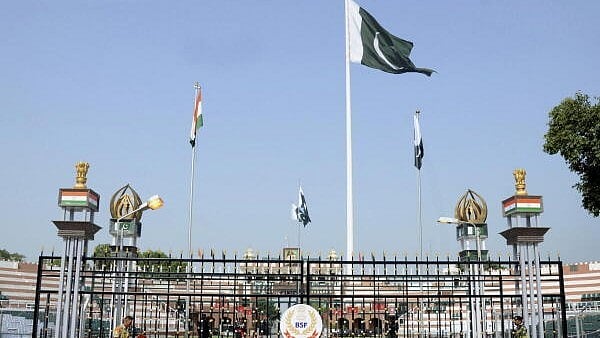
In this Saturday, August 14, 2021 file image, BSF jawans guard on the eve of India's 75th Independence Day at the India-Pakistan Attari-Wagah border post, some 40 km from Amritsar. The Cabinet Committee on Security decided to close the Integrated Check Post at Attari with immediate effect on Wednesday, April 23, 2025, after the Pahalgam terror attack.
Credit: PTI Photo
The deadly attack in Pahalgam in Jammu and Kashmir which killed at least 26 people has seen India unite against terrorism and extend support to the government in its efforts to punish the perpetrators. It has been a strong message of unity from the people, social groups, and political parties. In Kashmir, people responded to the terror attack by observing a shutdown, a first in 35 years. Political parties in the Union Territory and across the country have condemned the incident. However, caution is also in order because the attack cannot be allowed to divide people along communal lines and inflame passions. There have been reports about students and traders from Kashmir being subjected to intimidation and harassment in other states. Targeting the community over the incident calls for outright condemnation. This is also a time to remember that it was a Kashmiri pony ride operator – Adil Hussain Shah – who sacrificed his life trying to save the tourists from the attack.
The government has announced measures at the diplomatic level against Pakistan in response to its support for terrorism. They include the suspension of the six-decades-old Indus Waters Treaty (IWT), closing the only operational land border crossing at Wagah-Attari, downgrading of diplomatic relations, and visa restrictions on Pakistani citizens. Pakistan has responded by announcing that all bilateral agreements, including the 1972 Shimla agreement which created the Line of Control (LoC), will be held in abeyance. Pakistan is now at its most vulnerable position – India has an opportunity to ensure that it is diplomatically isolated and pays the price for fostering terrorism. Prime Minister Narendra Modi has said that every effort will be made to ensure that justice is delivered.
The government needs to weigh its follow-up actions with extreme care. It did well to convene an all-party meeting to brief the leaders of political parties about the incident and the measures taken in response. All parties have extended support to the government and assured that they are with it in combating terrorism. Security and intelligence failures which may have aided the terrorists and the concern over hate campaigns on social media were also raised at the meeting. Government action on both these issues was demanded. The terrorists who committed the massacre are still at large and they need to be apprehended. Only then will the details of the conspiracy and the extent of the terror network come to light. It is important that political leaders and the public refrain from inflammatory and sectarian comments, jingoist calls, and rhetoric on social media and other platforms.
